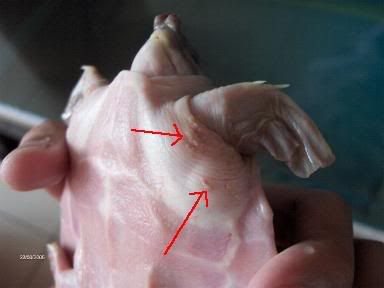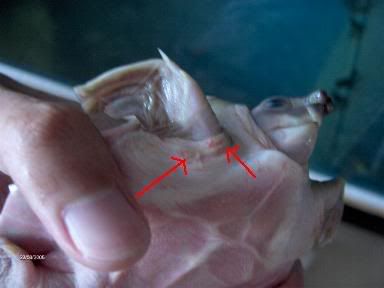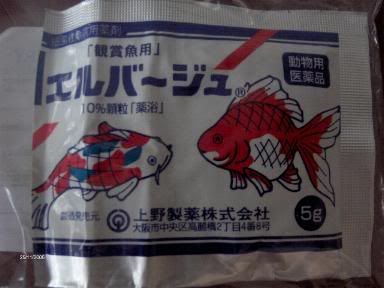
 |
|
|
|
|
|
#1 |
|
Dragon
 Join Date: Feb 2003
Posts: 2,793
|
Part 1: Choosing a PNT
1. How to Choose a healthy PNT Getting a healthy pnt is any hobbyist wld wish to do, however what are the things that one should look out for? A) The surrounding environment: The surrounding environment plays an important aspect in ensuring a pnt is in good health. Try to avoid pnts tad are found in dirty tanks such as tanks with dead fish in it, that there are sick pnts around. Reason is very simple, the pnt that you want could well be infected with diseases but it just haven't surface. So look for pnt that are livin in good tank condition and its other tank mate are healthy looking and lively. (i noe its quite diff due to many lfs standard in keepin pnt but just tried to find one tad is in a not so dirty environment) B) The Overall Ok now in selecting a pnt. Once u see a pnt you like, look at its overall behaviour in the tank. Try choosing one that is lively and swimming around, that is usually a sign of good health. Check to see if all its flippers is moving in a nioce coordination and not limpin action. Oso see whether the pnt have prb sinkin into the water. avoid pnt tad floats near the surface of the water all the time, it cld have some internal problem. Basically go for one tad can swim beautifully ard the tank down and up without any prb. After this simple observation, pick up the pnt above the water. You cld do it 2 ways one is to hold onto the side of the shell and the other is to put your whole palm underneath the pnt. I would recommend both coz each got a diff purpose. I shall go into holding the pnt on the side of the shell first. Just hold it above the water, a lively/healthy pnt will struggle all its flippers and try to escape from you whereas pnt that are not feeling well will jus dip down all its 4 flippers. do note sumtime pnt will stop movin oso due to the fact that it is scared and not sick but most of the time when a healthy pnt is scared it will struggle like mad to get rid of your holding. Up till this point, one can only be sure tad the pnt choosen is a lively one however whether it is healthy muz be determine further. C) The eyes Ok next come the 2nd way of holding pnt - the palm under the shell. this way of holding the pnt is to lessen its fear thus wun't be struggling tad much and u can better observe it. cup ur other free hand over the top shell to prevent the pnt frm any further strugglin. when checking the eyes, make sure it is not cloudy and free frm any foreign object. avoid pnt with teary and cloudy eyes. B) The nostrils Check that the nostrils is clear of foreign objects and there shld't be slime or runnin nose signs from the nostrils. C) The mouth Either in water or out of water, Pnt mouth normally shld be close (except when it comes to eating and bitin at others tankmates ) If you observe the pnt is gasping for air avoid choosin such pnt oso. D) The Shell The top shell shld be in a nice dome shape and shld't be straight out at the side. if it is den this cld be sign of an upturn shell. Check for any signs of cracks, dents, or foreign objects on the shell, you cld do this by runnin ur finger smoothly over the shell. Cracks, dents and foreign objects on the shell are signs tad the pnt cld have been injured b4 or have some fungus before. Do this for the bottom carapace oso. E) The flippers Feel the flippers to check for signs of broken bones, feel it dont pull the flippers. it is just like feelin ur ger fren finger go gently. there shldn't be any jottin feelin on the feelin meanin there cld be signs that the bones in the flippers have broken b4. G) The tail Just like any other part of the pnt, look for the anus and c if got any strange object or whether it is protruding. Avoid such pnt oso. |
|
|

|
|
|
#2 |
|
Dragon
 Join Date: Feb 2003
Posts: 2,793
|
Just a point to take note the information is given by our Bro Globe and very nice of him doing that.
And Picture copy from www.chelonia.org/sexing/sexing_Carettochelys.htm Last edited by Gus; 25-11-2005 at 09:29 AM. |
|
|

|
|
|
#3 |
|
Dragon
 Join Date: Feb 2003
Posts: 2,793
|
Part 1: Choosing a PNT (cont)
2. Choosing a male/female pnt. While some pple like to choose the sexin of their pnt. so here is basically how to differentiate. A) The tail. The pnt tail is the key to identifyin its sex. Male have thick base tail and their tail are usually longer. The anus of the tail shld be located far away frm the bottom carapace. in fact if you turn a pnt over u can c tad the anus is located outside the circumference of the top carapace. This is to ensure easier copulation. The female will be the opposite. Their tail will be thin and short. And their anus are usually located near the bottom carapace and within the circumference of the top carapace. The bottom is a very good link tad have pics to show wad i've said http://www.chelonia.org/sexing/sexing_Carettochelys.htm B) The Shell Other then looking at the tail. One could check the bottom carapace to further determine the sexing oso. Male pnt usually have concave bottom carapace. Whereas female bottom carapace will be flat out. |
|
|

|
|
|
#4 |
|
Dragon
 Join Date: Feb 2003
Posts: 2,793
|
Part 2: Housing a PNT
A Pnt unlike a terrapin doesn;t require any land spot. You can put it into a tank full of water 24/7. However a pnt still requires to come up to breath occassionally. To house a Pnt, personally I wld recommend 1 pnt in a 3' tank. Reason being, if you're thinkin of keepin the pet for long term, u can put all ur attention into takin care of just tad one pnt and controllin of the bioload of the water will be much more easier, not to mention the amt of money u can save in buyin food. Like any other pets, pple like to keep a pair or more. There are cases of successful pnt keep together and there are fail cases too. So its a gamble one has to take. Still a 3' tank wld be good to start off with. And cld last quite some time too, as pnt grows quite slow. The decor in tank is really up to personal preference. However avoid sharp stones as these cld injured or damage the bottom carapace. Sand is ok dun worry that it will get into its mouth, nose or eyes. In fact, i've seen pnt dig into these sand and hide in it leavin oni their nose up. And the sand cld leave the shell too. oh yah aquatics plants wld not be tad good coz pnt are omnivorous, they can actually eat up the plants tad you put in for decor. Thus wadever type of decor u put in do remember to clean them first and oso the more decor the more maintanence is needed. Part 3: Sick PNT PNT are usually quite hardy and seldom kanna any illness. When it does, in most of the time it is due to poor water condition. For this part i shall disucss more of the common illness A) Cloudy eyes. Pnt do get cloudy eyes just like fishes. Normally no medication is required. Just change your water ard 15-20%. add some salt can be up to 0.5-0.7% of the water volume and increase the temp to 28-30 degree. The cloudy eyes shld be able to go away in a few days. B) Skin fungus For skin fungus, use a soft cloth to wipe off whichever part tad the fungus is growing. Remember a soft cloth and not a brush or those sponge use for washing plate. Reason being, the fungus cld have already cause a hole in the shell and if you didn't notice it, u cld actually cause more harm to it. so a soft cloth wld be fine. and remember, wet the cloth. Using a little bit of warm water is ok. i mean warm and not hot water to wet the cloth. as warm water cld oso kill off the fungus on the shell. After wiping the fungus on the shell, you could bask the pnt in the sun to eliminate any remainin fungus or bacteria. -How to bask the pnt properly in the sun? Find a container big enuff to house the pnt. Fill it with water untill it reaches the side the the shell or u cld fill the water untill it jus cover the shell oso can. Put the pnt under indirect sunlight best is not to put it durin noon. I find the time of 10am -11am or 4am- 5am a good timin to bask pnt. Leave it there for a while cld be 15 mins or 30 mins but do check on it frequently to make sure the pnt is feelin ok. after the basking do not put the pnt immd back into the main tank. leave it at a side for a while at least min 5min to let the pnt temp adjust back to the same as the rm tank, den afterwards put it back to the main tank. U cld do this baskin for a few days untill the pnt is completely heal. Normally if you have a uv lightin. for ur pnt tank such baskin is not really required. |
|
|

|
|
|
#5 |
|
Dragon
 Join Date: Feb 2003
Posts: 2,793
|
Part 4: PNT diet
Ok regarding this many individuals have their own views. but i just generalize on wad I know and practice. PNT are omnivorous thus they take both meat and plants. Personally i wld recommend more plants den meat (more healthy mah) the ratio of feedin plant and meat shld be 3:1 or at least 2: 1. Always maintain a variety of food in its diet at least a min of 2. Avoid food tad contains high protein. Thou protein can promote growth but too much protein will lead to upturn shell and oso kidney prb in the pnt. And oso avoid food tad contains high oxalic contend such as spinach. As such food block the absorption of calcium effectively. Give food tad got higher calcium. The key to pnt diet is variety and high calcium. |
|
|

|
|
|
#6 |
|
Dragon
 Join Date: Sep 2002
Posts: 2,019
|
PNT like many other types of reptiles have different colour variation
There are primarily 3 main grp of colour tad pnt comes under. 1) the basic colour 2) the leucistic 3) the albino 1) For the basic colur group, this group of pnt are very commonly found in LFS. Usually the basic colour is grey however under this basic group there are variations as well. It range frm black, grey, olive, and whitish/pinkish grey This is the common grey pnt that we will normally see.  This is the olive variation  This is the black variation  this is the whitish/pinkish grey variation 
|
|
|

|
|
|
#7 | |
|
Guest
Posts: n/a
|
Quote:
|
|

|
|
|
#8 |
|
Dragon
     Join Date: Oct 2004
Posts: 1,168
|
It normal to get bite for PNT comm due to fighting or hunger. Below show some bite injury on PNT[refer to RED arrow].
  This injury can be treated by yellow solution [huang yao shui, those we human is using] or the yellow powder meant for our aqua pals.. Below show a pic of the packet of yellow powder. Just pour some powder into a small container and add some water to dilute it. then use a cotton-bud to apply on the injured area. After applying the solution, leave the PNT in a small container of water for abt 10 minutes before re-introduce the PNT back into the main tank.  
|
|
|

|
 |
| Currently Active Users Viewing This Thread: 1 (0 members and 1 guests) | |
|
|